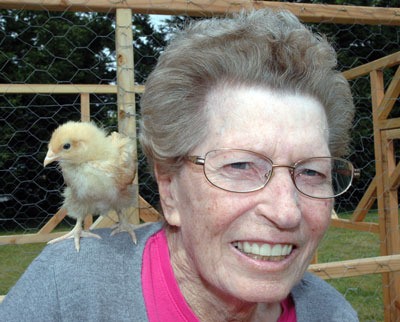ARLINGTON — On May 19, the Regency Care Center became home to a much younger crowd than they usually serve.
The four baby chickens in their new coop were only five days old at the time, and they won’t start laying eggs until this fall or winter, but in the short time since their arrival the new occupants have already endeared themselves to many of the seniors staying there.
“They’re so precious,” said 78-year-old Laura Lee Sawyer, a six-month resident of Regency Care Center, as she gently cupped a chick named “Itty” in her hands on May 29. “And they’re just tiny-tiny.”
Both Sawyer and 84-year-old LaRaine Friend, who’s been at Regency Care Center for two years, enjoy coming outdoors to visit the chicks in their coop, although Regency Care Center Activities Director Molly Weiland has conducted most of the care for the chicks so far.
“They’re time-consuming at first, because you have to regulate their heat,” Weiland said. “But once you’ve got that set, and you have enough water and feed for them, they’re kind of like cats who are happy as long as their litter boxes are clean.”
A year ago, Regency Care Center resident Annella Winkes passed away, leaving behind a small sum for the center, and when Weiland asked the family, they gave her their blessing to use that money to fund the establishment of a chicken coop at the center for the benefit of residents like Winkes, Sawyer and Friend, for whom such baby chicks are a familiar sight.
“A huge majority of our residents are former farmers,” Weiland said. “They didn’t want to lose that, but in many cases, that connection was taken away from them before they were ready to let go of it. For folks like that, there’s nothing more peaceful than looking out your window and seeing chickens in the yard.”
An investment of $200 got Regency Care Center not only the four baby chickens, but also some starter feed, a heat lamp and enough materials for volunteer labor to build a chicken coop, complete with a stained glass window. While Sawyer and Friend have visited with the chicks outside, Regency Care Center staff have also brought the chicks indoors on foul-weather days and for those residents who can’t easily leave their rooms.
“I like petting them and talking to them,” Sawyer said. “It’s like therapy. You have to hold them loosely. Don’t squeeze them. And if you talk to them, do it softly.”
“We had hundreds of chickens on our family farm,” said Friend, as a nameless chick perched calmly on her shoulder on May 29. “I look forward to seeing them grow.”
Although the city of Arlington recently upped its maximum limit of hens that can be kept within the city limits from five to seven, Weiland has no immediate plans to expand Regency Care Center’s flock of chickens beyond its current count of one Barred Rock, one Buff Orpington and two Light Brahmas. Arlington does not allow roosters to be kept within the city limits without a special permit, but the center has no plans to breed the chickens.
“We’ll sell the eggs, probably just to friends and family at first,” said Weiland, who added that the “chicken litter” would be used as compost for Regency Care Center’s vegetable gardens. “The chickens will become independent and the sales of the eggs should make the chicken coop self-sustaining in terms of costs.”
Regency Care Center Administrator Mike Shaw looks forward to hosting visits by children to the chicken coop, so that they can learn about sustainability, and is even talking with Silicon Energy in Marysville about the possibility of putting the coop on solar power. In the meantime, Weiland has already seen the comfort that the chicks have provided the center’s residents, and expects the relationship between the residents and the chickens to yield greater dividends down the line.
“By helping to care for the chickens, our residents will be able to get involved in the community by giving something back,” Weiland said. “They need to feel needed, and they used to be part of this community, so there’s no reason why they can’t still be.”







